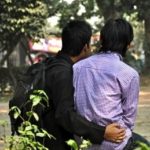(Updated June 2005)
Stories From Others
The following seven news accounts describe some of the major achievements and challenges facing lesbigay citizens in Israel today. 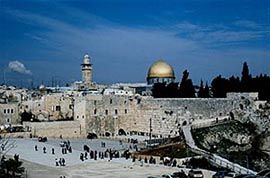 First, writer Phil Reeves reports on the conflicting views and actions of the gays and the right-wing Orthodox. Next, Heidi Gleit describes efforts to open a homeless gay youth shelter in Tel Aviv. Third, Andrew Quinn summarizes a research project about gays in the Israeli military. Fourth, Gleit again writes, this time about the politics of gay pride. Fifth, Jasmena Kelemen describes the upbeat and positive mood of last year’s Gay Parade despite Orthodox opposition. Sixth, Moshe Reinfeld tells about a favorable film board’s decision to allow 16 year-olds see a flick about gay love. Finally, Orly Halpernfter describes one bar in Jerusalem that embraces LGBT Israelis and Palestinians as well as Black Laundry
First, writer Phil Reeves reports on the conflicting views and actions of the gays and the right-wing Orthodox. Next, Heidi Gleit describes efforts to open a homeless gay youth shelter in Tel Aviv. Third, Andrew Quinn summarizes a research project about gays in the Israeli military. Fourth, Gleit again writes, this time about the politics of gay pride. Fifth, Jasmena Kelemen describes the upbeat and positive mood of last year’s Gay Parade despite Orthodox opposition. Sixth, Moshe Reinfeld tells about a favorable film board’s decision to allow 16 year-olds see a flick about gay love. Finally, Orly Halpernfter describes one bar in Jerusalem that embraces LGBT Israelis and Palestinians as well as Black Laundry
(1) Israel’s Gays Fear Rise of the Rabid Rabbis
On a bright blue Tel Aviv day, in the square where Yitzhak Rabin was assassinated, two young men wrap one another in their arms. They are wearing white pork-pie hats and shorts so small and tight. You can see the loose change in their back pockets (and more besides). Joyously, their faces meet for a busy, prolonged Ray-Ban to Ray-Ban kiss.
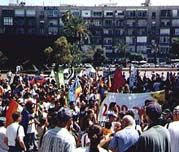 You would not bat an eyelid were this cameo in San Francisco or Sydney. But here it is startling. Is this not Israel, where stones are thrown at women in short sleeves who stray into religious neighborhoods, where a five-star international hotel fears losing its kosher certificate thus going out of business if its chefs chop their parsley too finely on the Sabbath?
You would not bat an eyelid were this cameo in San Francisco or Sydney. But here it is startling. Is this not Israel, where stones are thrown at women in short sleeves who stray into religious neighborhoods, where a five-star international hotel fears losing its kosher certificate thus going out of business if its chefs chop their parsley too finely on the Sabbath?
At least 8,000 people took to the streets on Friday for Tel Aviv’s third annual gay pride march, a happy and noisy cavalcade of drag queens and painted, bare-torsoed dancers parading through the hot streets beneath the rainbow-colored standard of the gay community worldwide.
Liberal Israel was out in force, heterosexuals included, providing more proof that the country’s secular majority can be as zealous and determined as the religious fanatics who oppose it. The display could hardly have been more timely. A day earlier, the Prime Minister, Ehud Barak, had saved his coalition from collapse by persuading Shas, a party run by ultra-Orthodox rabbis, to remain in government. That followed his two agonizing weeks of coaxing and cajoling the rabbis, caving in to one demand after another.
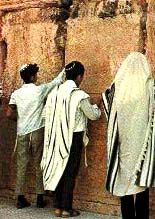 In the end, he was forced to sacrifice three ministers from the left-wing Meretz party, giving victory to Shas, a party with a leadership about as sexually enlightened as Saudi Arabia (sentence for cross-dressing: 2,500 lashes).
In the end, he was forced to sacrifice three ministers from the left-wing Meretz party, giving victory to Shas, a party with a leadership about as sexually enlightened as Saudi Arabia (sentence for cross-dressing: 2,500 lashes).
High in the Shas hierarchy is Shlomo Benizri. In the past, Mr. Benizri, Israel’s health minister, no less, has described homosexuality as a sickness, and suggested gays should be committed to mental institutions. The Israeli gay community has warily watched events unfold. “We are seeing the religious parties getting bigger and bigger,” said Gidon Bennett, 48, an English teacher, who was in the gay pride march. “The fear is that one day they could become the largest party in the country. If they ever got to power here, there would be a civil war.” For Noam Mol-Gal, a 27-year-old Tel Aviv student, it was further proof of the need for the gay community to be permanently on its guard. “There are plenty of people who want to turn back the clock.”
The Light Side
Despite this, Israel has made astonishing progress with gay rights. Twelve years ago homosexuality was decriminalized, much to the disgust of the ultra-Orthodox who regard it is a profound sin, an “abomination”, according to Leviticus. In 1992, Israel prohibited discrimination against gays in the workplace. The following year, the army decided to allow openly homosexual soldiers to serve in any capacity.
There was another breakthrough in 1994, when the Supreme Court required the national airline, El Al, to grant full spousal benefits to the same-sex domestic partner of an airline employee (two years later, the military courts followed suit, allowing gay partners to receive the benefits of fallen soldiers).
 When the transsexual singer Dana International won the 1998 Eurovision song contest, gay Israel donned its sequins and feathers to dance in the streets. Fiercely secular Tel Aviv has a lesbian city councilor, the first openly gay elected official in Israel, and a municipality willing to fund gay pride events. Although the Knesset, which sits 60 miles away in holy, hung-up Jerusalem, has yet to come out of the closet, the gay community at least has a champion in the chamber? Yael Dayan, the daughter of Moshe Dayan.
When the transsexual singer Dana International won the 1998 Eurovision song contest, gay Israel donned its sequins and feathers to dance in the streets. Fiercely secular Tel Aviv has a lesbian city councilor, the first openly gay elected official in Israel, and a municipality willing to fund gay pride events. Although the Knesset, which sits 60 miles away in holy, hung-up Jerusalem, has yet to come out of the closet, the gay community at least has a champion in the chamber? Yael Dayan, the daughter of Moshe Dayan.
The latest victory was last month when the Supreme Court gave an Israeli lesbian couple the right to be registered as the mothers of a son born to one of them.
The Shadow Side
But it is not all rosy. Social attitudes lag behind the law. Life for the “haredi” (ultra-Orthodox) gays is particularly painful, not least because coming out means ostracisation by their peers. Support groups, which include one called “Orthodykes”, see this issue as their hardest challenge.
Gays complain that Israelis use the word “homo” when they mean “idiot”; gays walking hand-in-hand in any other town than Tel Aviv are sure to be jeered at. And there are the occasional nasty incidents, when drunken young Russians decide to drop by the gay bars for a spot of goading. “You get jokes, sick jokes,” said Mr. Bennett. “The laws are more progressive than the people. Here, ‘homo’ also means ‘AIDS’. We are all seen as infected by HIV.”
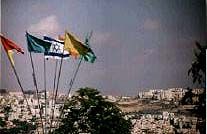 That particular prejudice was strikingly illustrated two years ago when the police turned up at a gay rally in Tel Aviv wearing Latex gloves. The gay movement was, understandably, outraged. You would expect similar sentiments to be directed at Mr. Barak, given his eagerness to appease the rabbis from Shas. Not so.
That particular prejudice was strikingly illustrated two years ago when the police turned up at a gay rally in Tel Aviv wearing Latex gloves. The gay movement was, understandably, outraged. You would expect similar sentiments to be directed at Mr. Barak, given his eagerness to appease the rabbis from Shas. Not so.
This week one gay Pride marcher after another said they understood why their Prime Minister has to make political compromises. “Barak needs a strong coalition if he is going to achieve peace,” said Russell Lord, 42, a Tel Aviv travel agent. “He is the only who Can bring peace. He has no choice.” Mr. Barak is a lucky man. At least some of his electorate believes peace with the Palestinians is paramount, even if that means living with a government containing a minister who thinks they are mad.
(Eight months later, in February 2001, Barak was defeated in his bid for re-election by hard-liner Ariel Sharon, much to the dismay of many in the gay community. As Israelis, they fear his ruthless past as an aggressor will influence the country’s policies and reduce chances for peace with its Arab neighbors. As gay citizens, they fear a less tolerant environment that will encourage more conservative decisions (the Orthodox ‘agenda’) in the Knesset thus threatening their hard-won rights.)
By Phil Reeves in Tel Aviv
From The Independent, London
25 June 2000
(2) Tel Aviv Hostel Planned for Homeless Gay Youth
When Michal Eden’s parents realized she was a lesbian, they threw her out of their home and cut off contact with her. Eden turned to her friends for shelter and assistance until she could get on her feet.
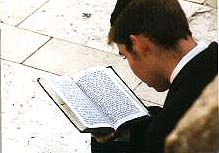 Now, 10 years later, as a member of the Tel Aviv City Council, Eden is working to provide assistance to youths in that position. For the past year she has been pushing the municipality to open a hostel for homeless gay, lesbian, bisexual and transsexual youth. Mayor Ron Hulda’i recently gave his approval to a plan which the municipal social services department developed with the assistance of homosexual organizations an organization to assist minors to open such a hostel in 2001.
Now, 10 years later, as a member of the Tel Aviv City Council, Eden is working to provide assistance to youths in that position. For the past year she has been pushing the municipality to open a hostel for homeless gay, lesbian, bisexual and transsexual youth. Mayor Ron Hulda’i recently gave his approval to a plan which the municipal social services department developed with the assistance of homosexual organizations an organization to assist minors to open such a hostel in 2001.
Gay, lesbian, bisexual and transsexual youths rarely turn to the two existing shelters for homeless youth in Tel Aviv, Eden said, saying that they do not feel comfortable mixing with the other youths there. These youths, who often are searching for their sexual identities and dealing with rejection by family and friends, need a nurturing place with a specialized staff, Eden said.
Research that the planning committee studied backed up Eden’s statements, said Ze’ev Friedman, executive director of social services in Tel Aviv. The research also showed a much higher suicide rate among homosexual teens than among heterosexual teens. Eden emphasized that the hostel will be more than a temporary shelter. It will also provide outpatient counseling to youths and their families and serve as a research center on homosexual youth. The homosexual community will be involved in the shelter and in helping find long-term solutions for the youths, such as their being adopted by mature homosexual couples, she said.
Bruria Zaltzman, the municipal social services official responsible for girls and youths at risk, said she has yet to encounter any opposition to opening a hostel for homosexual youths. People have been very supportive and understanding of the need, she said. However, since the municipality has not yet approved its 2001 budget, the project has yet to receive funding. Opening and operating costs for the first year are estimated at $400,000. Municipal officials hope that the Labor and Social Affairs Ministry, youth authorities, gay and lesbian groups and private donors will provide part of the budget.
By Heidi Gleit
Jerusalem Post
29 June 2000
(3) Gays Do Not Harm Israeli Military
The inclusion of openly gay and lesbian soldiers in the Israeli military has not undermined combat readiness, unit cohesion or military preparedness, according to a U.S. university study released on Thursday.
The study is the most comprehensive analysis in English of homosexuality in the Israel Defence Forces, said author Aaron Belkin, director of the Centre for the Study of Sexual Minorities in the Military at the University of California, Santa Barbara. Belkin and co-author Melissa Levitt of ELM Research Associates, a nonpartisan research firm in Berkeley, California, said their study indicated that “military performance did not decline” following a 1993 Israeli decision to allow avowed homosexuals to serve in the defense forces.
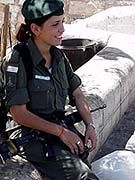 “In the US, the military ban is based on the idea that gays undermine performance and cohesion. The experience of foreign militaries shows that there is no evidence for this position,” Belkin said on Thursday.
“In the US, the military ban is based on the idea that gays undermine performance and cohesion. The experience of foreign militaries shows that there is no evidence for this position,” Belkin said on Thursday.
The United States and Turkey are the only members of NATO that still ban people who are openly homosexual from serving in their armed forces. Britain ended its ban in January after the European Court of Human Rights ruled that it was a violation of European human rights treaties to discharge military because of sexual orientation.
Other Countries’ Policies
Canada, Japan, Australia, New Zealand and the Scandinavian countries do not consider the sexual orientation of recruits or of military personnel on active duty. Belkin said the study, which involved interviews with Israeli military officials, gay and lesbian soldiers, and a review of published material on the subject, showed that the integration of openly gay and lesbian soldiers into the Israeli military occurred smoothly.
“Contrary to the claims of some American experts, some Israeli soldiers in combat units do come out of the closet,” a summary of the report said. “Even in these cases, Israeli officials report no deterioration of unit cohesion or performance.”
The report found that gay and lesbian soldiers adapted to military life just as well as their heterosexual counterparts and that in most cases, homosexuality was “peripheral to these (gay and lesbian) soldiers’ preoccupations.” Belkin said the report’s results mirrored a similar study of the Canadian military after that country’s decision to drop its ban on gay and lesbian soldiers in 1992. He added that the two studies would provide academic data for the debate over gays and lesbians in the U.S. military, which caused a political firestorm in 1993 when President Bill Clinton sought to reverse the long-standing U.S. ban.
The 1993 controversy ended in the adoption of the U.S. military’s current “don’t ask, don’t tell” policy, which allows homosexuals to serve in the military but continues to forbid homosexual acts and requires gay and lesbian service members to keep their sexual orientation private.
By Andrew Quinn
Reuters
29 June 2000
(4) Gay Pride Paraders Blast Shas
Thousands of people from around the country converged in Tel Aviv Friday afternoon for the country’s annual Gay Pride parade.
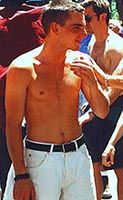 The event’s political tone was different than in previous years, as politicians competing for the gay community’s support took turns taking shots at Shas during the opening ceremony.
The event’s political tone was different than in previous years, as politicians competing for the gay community’s support took turns taking shots at Shas during the opening ceremony.
“You are the answer to [Shas MKs] Nissim Ze’ev and Shlomo Benizri… Everyone participating in this event is advancing human and individual rights,” MK Naomi Chazan (Meretz) told the crowd, adding that her party had always been at the forefront of that struggle. Haim Oron (Meretz), in what may have been his last public appearance as Agriculture Minister, said the gay community’s battle will help create a more tolerant society.
After pledging support for gays and lesbians, MK Tommy Lapid (Shinui) declared his frustration that his bill to legalize gay unions, currently under preparation for presentation to the Knesset, is doomed to failure due to “the powers of darkness in the Knesset.”
After expressing her regret for Meretz’s resignation from the government, Hadar Namir, of the Association of Gays, Lesbians, Bisexuals, and Transsexuals, called on the community to unite to better advance its interests instead of wasting energy on internal battles.
The opening ceremony’s political tone did not affect the festive atmosphere of the colorful parade through north Tel Aviv and the happening in Yarkon Park. People hung out of their windows and gathered on the streets to watch the floats carrying dancers in drag. Marchers with rainbow flags and banners from various human rights organizations were interspersed with the floats. Bringing up the rear were young Meretz and Shinui activists carrying their respective parties’ flags.
By Heidi J. Gleit
Jerusalem Post
25 June 2000
(5) Israel Gay Parade Shows Culture War
Celebrating gay pride, thousands of Israelis in tank tops and shorts danced to deafening trance music and waved rainbow-colored flags Friday. The annual street party has become the latest venue in the culture war between secular Israelis and devout Jews who consider homosexuality an abomination.
“We promise to support your struggle against the religious,” legislator Tommy Lapid, leader of the secular rights party Shinui, told the cheering crowd. In recent years, gays and lesbians in Israel have scored a string of successes in the courts, though not in parliament, where ultra-Orthodox religious parties have considerable clout.
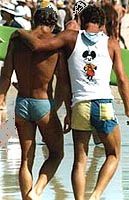 Last month, the Supreme Court allowed a lesbian spouse to be registered as the second parent of her partner’s biological son. In 1994, same sex unions were recognized for benefit purposes. The court rulings have coincided with growing public acceptance of gays. Just a few years ago, public displays of gay pride were unheard of in Israel.
Last month, the Supreme Court allowed a lesbian spouse to be registered as the second parent of her partner’s biological son. In 1994, same sex unions were recognized for benefit purposes. The court rulings have coincided with growing public acceptance of gays. Just a few years ago, public displays of gay pride were unheard of in Israel.
By contrast, gays were hugging and kissing in Tel Aviv’s central Rabin Square in 1998 to celebrate the transsexual singer Dana International’s victory in the Eurovision Song Contest. Over the last few years, the gay pride parade has drawn more and more people. On Friday, Rabin Square was lined with Israeli flags and the Rainbow banners of the gay pride movement. Techno music blared from loudspeakers mounted on trucks.Some in the parade donned elaborate costumes, while others wore shorts and T-shirts. Families brought their children, and some homosexual couples walked hand-in-hand. There were no religious protests.
Tel Aviv is an overwhelmingly secular city, and the parade was being held just before the onset of the Jewish Sabbath, during which observant Jews refrain from work and travel. Taking a break from the blazing heat, Kinneret Golan said the scene made her feel that Israel was no different from other countries. “You only see pictures of Israel when rocks are being thrown. I’m proud that despite everything we can still do this,” she said. Golan said that in the increasingly bitter culture war between Israel’s secular majority and the devout minority, the distrust is so great that “each side defines itself as the opposite of what the other is.” Therefore, she said, many secular Israelis will support causes as long as they are denounced by the religious community.
Lapid, standard bearer of the secular fight against what he calls religious coercion, said his party and the homosexual movement are natural partners. Next week, a bill proposing recognition of same-sex civil unions will be up for approval. However, Lapid said it will likely fail because of the influence of the religious parties.
Some of those dancing in the parade said they paid little heed to politics. “Who cares what they do in the Knesset? Look at this celebration,” said Anat Schumaker, one of the participants. “We’re here and they can’t do anything to stop us.”
By Jasmena Kelemen
Associated Press
23 June 2000
(6) Film Board Okays Gay Film for 16-Year-Olds
The film censorship council informed the High Court that it is reversing a previous decision,
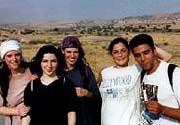 and lowering the age restriction from 18 to 16 on a film about young homosexuals in love.
and lowering the age restriction from 18 to 16 on a film about young homosexuals in love.
Gay rights organizations, together with “Gil Productions,” the producers of the film “Almost 18,” petitioned the court, protesting the council’s earlier decision to raise the age limit to 18. In response to the petition, the council conducted a survey of its members, and voted 10 to 3 in favor of lowering the age limitation.
By Moshe Reinfeld
Ha’aretzNews
16 August 2000
(7) Gay Tel Aviv a ‘Golden Ghetto’
In America, Robert Lebow was enemy number one of the far right. In Israel, he is not. “Folks here face different threats,” says Lebow, an openly gay resident of Tel Aviv. Israelis live with the specter of “bombs on buses and buildings blowing up. Everyone here knows someone who has been injured or maimed. You think they’re going to worry about two men kissing?”
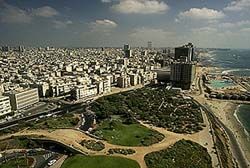 When Lebow moved to Tel Aviv six months ago, it was for personal rather than political reasons. Nonetheless, when he arrived he couldn’t help but notice Tel Aviv’s sexually progressive atmosphere, especially when compared to that of the United States — specifically Detroit, where he lived for more than 40 years.
When Lebow moved to Tel Aviv six months ago, it was for personal rather than political reasons. Nonetheless, when he arrived he couldn’t help but notice Tel Aviv’s sexually progressive atmosphere, especially when compared to that of the United States — specifically Detroit, where he lived for more than 40 years.
On a warm Tuesday evening, Lebow keeps company with fashionable gay men sipping lemonade and espresso at Cafe Nord on Tel Aviv’s Ben Yehudah Street. The cafe’s patrons — dressed in tight T-shirts, denim shorts and work boots — bear a striking similarity to many gay men in San Francisco’s Castro District.
However, Tel Aviv’s gays maintain a comparatively quiet presence. This isn’t for fear of discrimination or oppression, although the Middle East is undeniably macho, but rather because there is nothing to fear. “There are few gay activists here. We don’t need them,” Lebow said. For Tel Aviv residents, being gay “just is. I think that’s why people aren’t aggressively ‘out’ like I was in Detroit.”
Compared to the United States, Israel’s laws regarding gays are progressive. In 1988 the Israeli Supreme Court decriminalized sodomy. In 1992 it passed an equal opportunity law forbidding discrimination against workers based on sexual orientation. A gay El Al Airlines steward emerged victorious from the same court in 1993 after a decision that rendered gay partners eligible for employee benefits: Such benefits were previously reserved for spouses only.
The Society for the Protection of Personal Rights for Gay Men, Lesbians and Bisexuals in Israel spearheaded these battles. The organization, established in 1975, hosts support groups, political forums and a prayer group called Congregation Ga’avat Israel. It maintains chapters in Tel Aviv and Israel and is supported by the New Israel Fund.
Meanwhile, gays and lesbians in Israel continue to serve their three-year mandatory military service alongside their heterosexual compatriots. Sexual orientation is not a valid excuse for dodging army service.
In addition, the Tel Aviv-Jaffa municipality acknowledges gay and lesbian domestic partnership agreements drawn up by local lawyers. This legal document affords couples the benefits of a religious marriage under laws of the Jewish state.
A Liberal City
All told, Tel Aviv’s gay scene appears remarkably closeted by San Francisco standards. 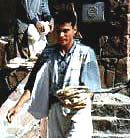 Absent are Western-style flamboyance and the radical activities of groups like Queer Nation. Still, “that does not mean a healthy gay society is nonexistent,” Lebow says. He points to newsstands displaying an Israeli magazine simply titled GAY, and he notes that thousands of gays and lesbians from around the world converge here each year for an annual gay film festival.
Absent are Western-style flamboyance and the radical activities of groups like Queer Nation. Still, “that does not mean a healthy gay society is nonexistent,” Lebow says. He points to newsstands displaying an Israeli magazine simply titled GAY, and he notes that thousands of gays and lesbians from around the world converge here each year for an annual gay film festival.
“You can see gay couples being affectionate and openly gay on beaches, on the streets, in coffee houses. Not everyone — some,” Lebow says. They’re at Cafe Nord and at Abbis — a smoky pub pulsing with 1970s music and American films. They’re at the Playroom — a loud, high-priced disco catering to the under-20 crowd — and a number of other locations.
In the evenings, men also gather at Gan Ha Atzmaut, Independence Park, meeting beneath its trees. While heterosexuals who live nearby say they are aware of the park’s nighttime scene, they deny that Israel has many gays. Nevertheless, men congregate nightly in the park, adjacent to the line of high-rise hotels along the Mediterranean coast.
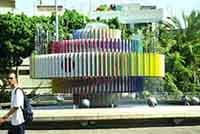 And unlike American parks, Gan Ha Atzmaut is safe after dark. A man dressed in linen trousers and eelskin loafers and wearing expensive jewelry laughs when asked if he is afraid here at night. “Of what? Getting robbed? This is not Central Park. This is our park,” he says. “This is a gay park. We take care of our own.” Like Lebow and others, this man does not fear that Israel’s attitude toward gays will change under the leadership of any particular party or an Orthodox Knesset members.
And unlike American parks, Gan Ha Atzmaut is safe after dark. A man dressed in linen trousers and eelskin loafers and wearing expensive jewelry laughs when asked if he is afraid here at night. “Of what? Getting robbed? This is not Central Park. This is our park,” he says. “This is a gay park. We take care of our own.” Like Lebow and others, this man does not fear that Israel’s attitude toward gays will change under the leadership of any particular party or an Orthodox Knesset members.
The right wing “is a little scary. But nothing here really frightens me too much,” Lebow says. “I don’t think there’s enough of a religious stronghold to change things in a pejorative manner. People are worried about education, housing, immigrants, and territories. Not us. Besides the religious party has always been vital to Israeli politics. It’s always been a presence and a force.”
Even so, Lebow admits that Tel Aviv is the only place where gays in Israel can have an active social life, as the city is both Western and liberal. “This is the golden ghetto,” Lebow says. “Haute couture — Karan, Kristoff. Cafes on sidewalks,” he says. Tel Aviv vibrates “30 hours a day, 10 days a week.”
By Lesley Pearl
Tel Aviv Bulletin
19 July 1996
(8) In These Times
Isn’t That Queer-Israeli and Palestinian LBGTs Celebrate, Drink and Talk in One Club–Along with Black Laundry
Almost 2 years of bitter fighting, trust between Israelis and Palestinians has never been lower. But in a packed, smoky nightclub on the edge of Jerusalem’s ultra-Orthodox Mea Shearim district, the gay communities from both sides still bridge the growing divide, breaking down racial and political barriers as Jews and Arabs defy traditional stereotypes and threats of suicide bombers.
While tensions are high in the rest of the country, Laila’s remains the only nightclub where Israeli Jews clap enthusiastically side by side with Palestinian Arabs. Does the fact that these revelers are gay, lesbian or bisexual have anything to do with their mutual tolerance? Absolutely.
“Here we don’t care where you are from or who you are, Jew or Arab. That’s what characterizes the gay world,” says Johnny, a Christian Palestinian Arab from East Jerusalem wearing a tight white shirt and stylish jeans as a Jewish friend greets him with a kiss.
“I have 10 children,” says Simo, an ultra-orthodox Jew wearing a black suit and yarmulke, as he pulls out photos to show Johnny and Amir, the Arabs sitting near the bar with him. “I raise them to believe that all people are the same.”
“No one is prejudiced, you feel very free here,” says Rotem, a 19-year-old Israeli. Simo agrees: “As a religious man … I feel more comfortable to come to this place than to go to a straight place. I love my wife, but I do have a slight attraction to men.” Despite his attraction, Simo admits, “I’m scared to realize my fantasy of being with one.”
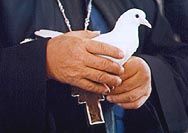 Simo, Johnny, Amir and Rotem sit together in the hot dark nightclub talking about their belief in God as Kylie Minogue blares in the background. “I used to be religious,” says Amir, who has a goatee and wears a tight red shirt. “I prayed five times a day at the Dome of the Rock mosque. I tried for two years to be religious [and not gay], but it was a waste of time. I’m proud to be gay and have been for the last 10 years. This is the way God made me.”
Simo, Johnny, Amir and Rotem sit together in the hot dark nightclub talking about their belief in God as Kylie Minogue blares in the background. “I used to be religious,” says Amir, who has a goatee and wears a tight red shirt. “I prayed five times a day at the Dome of the Rock mosque. I tried for two years to be religious [and not gay], but it was a waste of time. I’m proud to be gay and have been for the last 10 years. This is the way God made me.”
But the political reality outside Laila’s divides these four. Because of severe Israeli security measures, Palestinians are having increasing difficulty coming to downtown Jerusalem, where Laila’s and the Open House, a gay support center, are located. Even those from East Jerusalem, who are considered “permanent residents” of Israel, have trouble passing the newly erected military checkpoints on their side of the city.
Yet despite the checkpoints, many take the trouble to get to Laila’s anyway. “Palestinians feel good to come here because they don’t get harassed,” says club owner Avi Specter, a Jew from Germany who immigrated six years ago. Specter and his wife, Ann Marie, opened the place because he has “many gay friends in Europe who complained when they visited Israel that there are no gay bars in the city. It was our idea to make this place for all kinds of people.”
The first ever Jerusalem Gay Pride Parade took place last June, attended by more than 4,000 people. Despite threats of attacks by ultra-Orthodox Jews, who opposed having a gay celebration in the holy city, the event highlighted the connection between Jewish and Arab gays and the occupation of the Palestinian Territories—even though very few Arabs showed up.
Yasser, 31, a father of three from the Old City, explains why: “The Arabs are scared of being filmed on TV and being seen. Our families don’t know we are gay and that we are here.”
A group of 50 women and men wore black shirts with pink writing in Arabic and Hebrew that said “Black Laundry against the occupation, in favor of social justice.” Founded in Tel Aviv last year, “Black Laundry” members directly connect their sexual tendencies with their fight for Palestinian freedom.
“We protest against the festive nature of the pride parade [because they’re] doing it while the occupation is going on. Pride is a political thing. We can’t celebrate our freedom while other groups are oppressed,” explains Gali, 22, a lesbian from Tel Aviv wearing the Black Laundry shirt and fishnet stockings.
Anat, a 27-year-old lesbian from Tel Aviv and a founder of Black Laundry, adds: “There is a connection between our oppression as lesbians, homosexuals and the oppression of the Palestinians. Since the intifada, the city of Jerusalem is covered with posters and graffiti saying ‘Expel the Arabs.’ Yesterday the city was covered with graffiti saying ‘Expel the homosexuals.’ I don’t want this [parade] to be a fig leaf for the abuses of human rights. A few kilometers from here there are people under siege, people who are hungry.”
By Orly Halpernfter
August 16, 2002
( http://www.inthesetimes.com/issue/26/21/culture2.shtml )
Also see:
Gay Israel Stories
Gay Israel News & Reports 2000 to present
Gay Israel Photo Galleries



